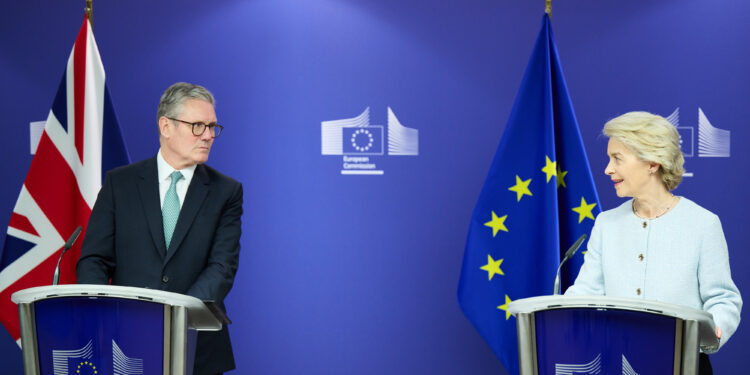Brussels—Strengthened cooperation and a common policy to address global challenges in the geopolitical and economic spheres are pressing for both the European Union and the United Kingdom.
British Prime Minister Keir Starmer and European Commission President Ursula von der Leyen met today (Sept. 2) in Brussels as part of his push for a reset with the EU and as a first opportunity to discuss issues such as trade, security, and youth mobility. Starmer, whose Labour Party won the election in July, said his government would not seek to negotiate en bloc the Brexit deal that took Britain out of the European Union in 2020.
“I firmly believe that the British public wants to return to a pragmatic and sensible leadership when it comes to dealing with our nearest neighbours to make Brexit work and to act in their interests, to find ways to increase economic growth, strengthen our security, and address common challenges such as irregular immigration and climate change,” the British premier said.
The first common ground is the strong condemnation of Iran after last night’s missile attack on Israel. Starmer said, “We need to step back from the brink with the courage of all parties to find a way for de-escalation and a political solution for the many fronts of the crisis in the Middle East,” he added. Both acknowledged the need to coordinate the diplomatic response to the situation in the Middle East, stressing the cruciality of an immediate ceasefire in Lebanon and Gaza to create the necessary space to enable political solutions. Also, regarding Russia’s illegal invasion of Ukraine, their unwavering support for Ukraine’s sovereignty was reiterated.
The uniqueness of the Anglo-European relationship was recalled, so we must continue working closely to deal with common goals, such as irregular migration, climate change, and energy prices.
The mutual interest of the UK and the EU is in a stable, positive, and forward-looking relationship, which forms the basis for long-term cooperation. “The common vision of the EU and UK makes it possible to strengthen bilateral relations,” von der Leyen added.
“We have several solid agreements. We should explore possibilities for more cooperation,” von der Leyen commented, referring to existing agreements. The basis of their relations remains the Withdrawal Agreement, including the Windsor Framework and the TCA (Trade and Cooperation Agreement), to which both partners have pledged full commitment. “We are strongly aligned in the fight against climate change and global warming. We both work intensively for decarbonization, circular economy, and nature protection,” she added.
Regular summits will be held between the two at the leadership level to consolidate and oversee the development of EU-UK relations. Of most interest are economy, energy, security, and resilience, with full respect for internal procedures and institutional prerogatives. They agreed that a first summit should ideally take place in early 2025.
There was no mention of youth mobility, on which the Commission had proposed reopening negotiations but clashed over a rejection from the UK, which apparently remains.
English version by the Translation Service of Withub






